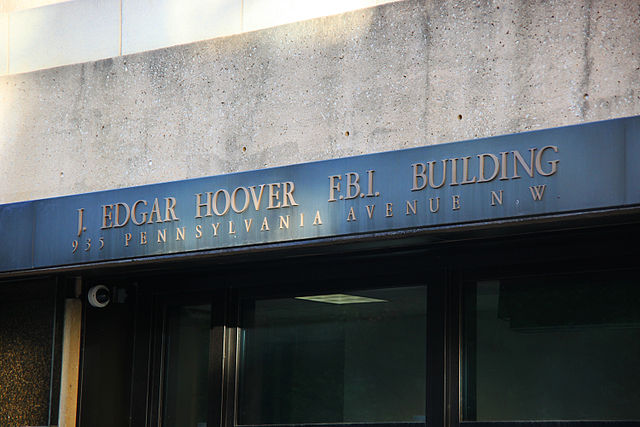On the Mood Among My Former Colleagues at the FBI
On May 9, immediately after the firing of FBI Director James Comey, Deputy Press Secretary Sarah Huckabee Sanders told CBS that the administration fired Comey, at least in part, because “rank-and-file” FBI employees had lost confidence in the Director—a claim that Acting FBI Director Andrew McCabe later disputed when he testified before the Senate Intelligence Committee a few days

On May 9, immediately after the firing of FBI Director James Comey, Deputy Press Secretary Sarah Huckabee Sanders told CBS that the administration fired Comey, at least in part, because “rank-and-file” FBI employees had lost confidence in the Director—a claim that Acting FBI Director Andrew McCabe later disputed when he testified before the Senate Intelligence Committee a few days later.
I know a little something about rank and file FBI employees, having been one myself. I worked at the FBI for five years as an analyst in counterterrorism investigations before going to law school, and I still have a lot of friends and former colleagues there.
So Benjamin Wittes asked if I would write a short piece on morale at the Bureau following the firing. For the record, given what follows, let me stress that he didn’t ask for a puff piece about Comey. He asked what I could glean about the disparity between the White House’s account of the matter and McCabe’s. What is the mood like, he asked? And is there anything to be said for Huckabee Sanders’ claim?
I was hesitant to post on the subject. I am no longer an employee of the FBI, and even if I were, I would have concerns about presuming to speak on behalf of the more than 35,000 employees. I wasn’t sure I could write a fact-based post that would be able to capture or do justice to the mood of a massive and diverse organization. I’m not a pollster, after all.
But here’s the thing: opinion on the subject within the Bureau is not, as far as I can glean anyway, diverse at all. I spoke about my concerns with a friend and former coworker, explaining that I was worried that if I were to write on the subject, the post would devolve into a weepy love letter to Director Comey. My friend’s response went a long way towards summing up what, I believe, is actually the overwhelmingly consistent reaction of FBI employees to the firing of the director: “But how could the post be anything except a weepy love letter?”
Because the basic truth is that while Comey was a controversial figure in the larger political system and among Justice Department officials, he was not a controversial figure at the FBI at all. Nearly everyone loved him. In any other piece, I would caveat this statement as obvious hyperbole and oversimplification of the situation, but the degree of consensus on this point as I have talked to people has been incredible. In the most literal sense of the word, it’s almost hard to believe.
My former coworkers who agreed to help me with this post represent a variety of career paths within the FBI. With very few exceptions, all of them are “rank-and-file” employees. They come from diverse backgrounds and, in their personal lives, represent almost the entirety of the ideological spectrum. If you were to invite them all to a dinner party and bring up politics, I can’t guarantee that everyone would make it out alive. There are also a lot of them. I don’t want to go into specifics because people have legitimate fears of retaliation for speaking out right now. But consider this post as reflecting input from as many as 20 individuals.
All of the people I talked to described having the same reaction when they heard that the director had been fired: complete shock, followed by deep sadness.
Several employees spoke of Director Comey as a kind of father figure, and equated his leaving the organization with the death of a family member. They described him as a leader who acted on a daily basis with the utmost integrity. He pushed his employees to realize their own potential and leadership capabilities. By all accounts, he was working to turn, very slowly, a massive bureaucratic ship and change the organizational culture of the Bureau—and had the full support, if not always the agreement, of those who worked for him.
Comey’s decision-making process earned him enormous respect both at FBI Headquarters and in the 56 field offices around the country. He was transparent in his thinking, and he continuously engaged employees “as shareholders” as he weighed different options. Feedback and participation were encouraged, and Director Comey was methodical, almost academic, in his approach to problems. But when a final decision had to be made, there was no doubt that the Director was the one who made it.
This is not to say FBI employees always agreed with all of Comey’s decisions. But in talking with my former coworkers, I heard the same sentence over and over again, in completely independent conversations: “Even if I didn’t agree with the decision Director Comey made, I respected his decision and I respected him.” No one doubted his motives, or whether he was acting with integrity in any given situation.
In no instance was this more apparent than with respect to how Comey dealt with the Clinton emails investigation. Some employees agreed with how he handled the situation. Some felt he was “damned if he did and damned if he didn’t.” Others didn’t agree at all. But no one called into question his motives or integrity. As one employee, and Hillary Clinton supporter, noted: “I don’t agree with the decision he made with the Clinton emails. But I believe he made that decision with integrity and did what he believed was best for the Bureau and the country.”
If you talk to enough FBI employees, you’ll also likely find that almost everyone has a Jim Comey story. This is quite impressive when considering how many employees work at the FBI, both in the U.S. and abroad. In his testimony, Acting Director Andrew McCabe referred to the “deep and positive connection[s]” that FBI employees had with the former director. From listening to employees’ stories, these connections are acutely personal. There are stories about case agents thinking their officemates were pranking them when Comey called to congratulate them about a recent arrest or investigation. One former employee described how Comey high-fived her when she won the Director’s Award for Excellence, a prestigious award given each year to a select number of employees. (She asked for the six-foot-eight director’s permission to high-five him. He laughed, and raised his hand high above his head.) He encouraged employees to email him directly, giving instructions on which system to use to bypass any screening by his administrative staff. When employees took him up on this offer, he responded—personally and quickly.
In most of my conversations, I finally had to ask the question, “Do you know, or have you at least heard of, any employees who didn’t support and love working for Director Comey?” While there were a few employees who told me that they had heard of someone in X unit or on Y squad who supported the firing, no one I spoke with had met these unicorns directly.
While the reaction across the organization seems to be fairly consistent, so does the current mood within the Bureau—which is to say that it’s business as usual. By all accounts, the firing has not affected the day-to-day work of “rank-and-file” FBI employees. The FBI is designed to be an apolitical machine, and as one former colleague told me, “We do this job for a reason, and it has nothing to do with politics.”
During her press conference, Huckabee Sanders said that one of the reasons the administration fired Director Comey was to restore the “credibility” of the FBI. Ironically, many of the employees I spoke with felt that the administration’s narrative surrounding the firing actually served to damage unfairly the FBI’s reputation. They were understandably puzzled and insulted by the administration’s tone during the firing, a tone which they felt insinuated that they, as career employees, weren’t independent thinkers but were acting politically.
Two associations representing FBI employees have begun to engage in the selection process.
On May 18th, the FBI Intelligence Analysts Association, which represents a portion of the 22,000 non-agent employees in the FBI, published a letter calling for a nonpartisan, independent director. The letter, which was sent to Attorney General Sessions as well as ranking members in both the House and the Senate, enumerated several qualities that should be considered in the selection of the next director. Most notably, the association called for a director who understands and supports the FBI’s intelligence mission. More than a decade after the Intelligence Reform and Terrorism Prevention Act, the Analysts Association implores Washington to select and confirm a director who will ensure the FBI completes, “its transformation into a threat-based, intelligence-driven national security organization.” Director Comey, building on the work of Director Robert Mueller, had articulated that intelligence was at the core of everything the FBI did, and had prioritized making intelligence a true profession within the FBI.
Several days earlier, the FBI Agents Association endorsed former FBI agent and Representative Mike Rogers for FBI Director. In an official statement, the organization, representing 13,000 current and retired agents, called for a director, like Rogers, who would be committed to, “the centrality of the Special Agent to the Bureau’s mission.” Rogers was a Special Agent in the Chicago Division from 1989-1994 before leaving the FBI to run for Michigan State Senate.
While the two professional organizations have outlined different ways forward for the FBI, members of both mourn the loss of Director Comey. At the same time, life and investigations do carry on. So while accusations continue to fly out of the White House and the search for the next director drags on, FBI employees continue to do what they’ve always done: their jobs.



.jpeg?sfvrsn=c56aabb1_5)

